Drinking more water doesn’t magically melt fat, but it does something just as powerful: it quietly changes how your body behaves around food and energy. If you’ve ever felt hungry right after eating, or crashed mid-afternoon even after a good meal, you might not be lacking willpower-you’re just not hydrated enough.
Water Turns Off Hunger Signals
Your brain doesn’t always tell the difference between thirst and hunger. That mid-morning craving for a snack? It could be your body asking for water, not calories. Studies show that drinking 500ml (about 17 ounces) of water 30 minutes before a meal reduces how much you eat by up to 22%. That’s roughly 111 fewer calories per meal. Over time, that adds up. In one study, overweight adults who drank two glasses of water before breakfast, lunch, and dinner lost nearly 2 kilograms more over 12 weeks than those who didn’t. Why? Because water fills your stomach. That stretch triggers signals to your brain that say, “Enough.” Within 15 to 20 minutes, your appetite drops. No willpower needed. Just a glass of water. This isn’t a trick. It’s biology. The stomach sends real signals to the vagus nerve, which tells your brain you’re full. When you drink water before eating, you’re essentially hitting the pause button on overeating. And unlike diet sodas or sugar-free snacks, water doesn’t trick your brain into expecting calories it never gets-meaning no rebound cravings.Water Burns Calories-Yes, Really
Think of your body like a furnace. When you drink cold water, your body has to warm it up to 37°C (98.6°F). That takes energy. It’s called water-induced thermogenesis. And yes, it burns calories. A study in the Journal of Clinical Endocrinology & Metabolism found that drinking 500ml of water increases your metabolic rate by 24-30% for about 40 minutes. That’s about 23 extra calories burned per liter. Sounds small? Multiply that by four or five glasses a day, and you’re looking at 100-150 extra calories burned daily-without stepping foot in the gym. It’s not a magic bullet. But when you’re trying to lose weight, every little bit helps. And unlike intense workouts or strict diets, this costs nothing and requires zero effort beyond remembering to drink.Water Beats Diet Drinks for Weight Loss
Many people think switching from soda to diet soda helps them lose weight. But research says otherwise. In an 18-month trial with 81 women with type 2 diabetes, those who replaced all sugary and diet drinks with plain water lost an average of 6.8 kilograms. The group that kept drinking diet beverages lost only 4.8 kilograms. Why the difference? Artificial sweeteners in diet drinks may disrupt your gut bacteria and confuse your insulin response. They also train your brain to crave sweetness, which can lead to more snacking later. Water? It does none of that. It cleanses your palate, resets your taste buds, and doesn’t trigger any metabolic confusion. The American Diabetes Association now recommends water as the preferred drink for anyone trying to lose weight or manage blood sugar. That’s not a suggestion-it’s a clinical guideline based on hard data.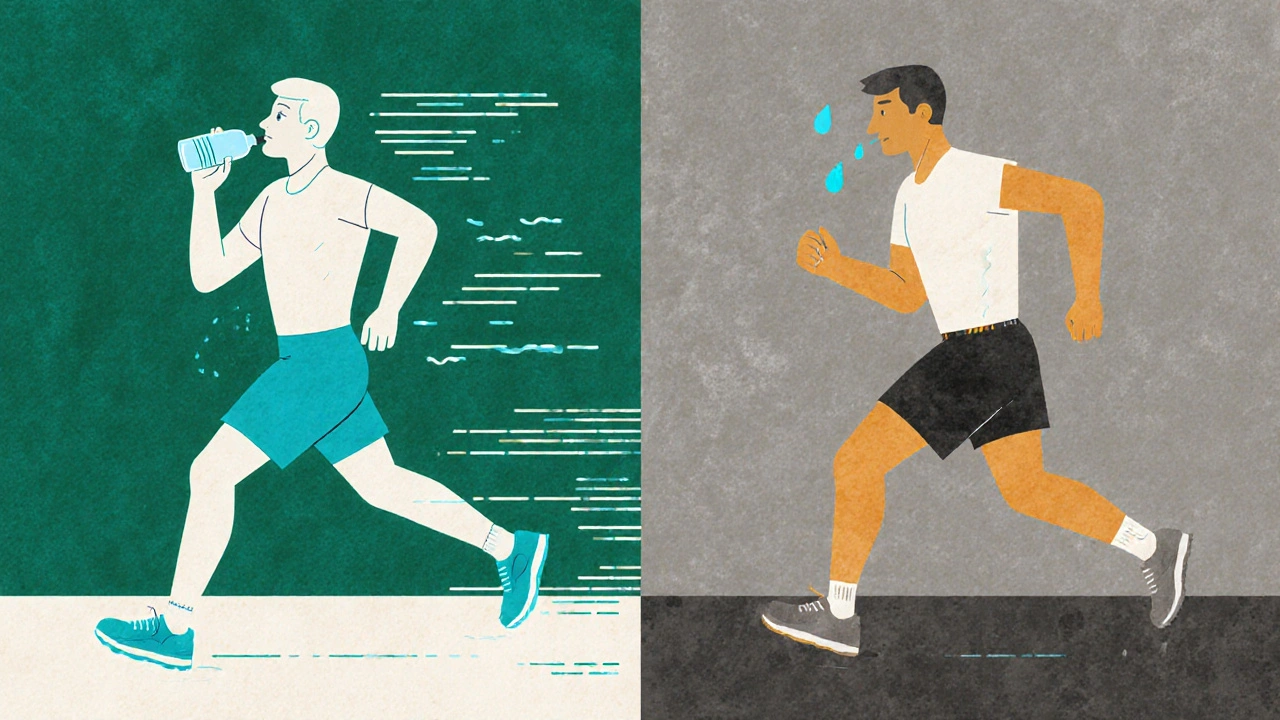
Timing Matters: When You Drink Water Is Just as Important as How Much
Drinking water all day long is good. But drinking it right before meals? That’s where the real weight loss happens. In a study published in Obesity, middle-aged adults who drank 500ml of water 30 minutes before each main meal lost twice as much weight as those who didn’t. The key? Timing. Drinking too early means the water passes through before you eat. Drinking too late means you’re already full. Thirty minutes before eating gives your stomach time to stretch and your brain time to register fullness. Try this: Keep a 500ml bottle next to your plate. Drink half of it before you start eating, and the rest halfway through. You’ll naturally slow down, eat less, and feel satisfied with less food.Hydration Improves Exercise Performance
If you’re working out to lose weight, being dehydrated is like driving a car with the brakes on. Even mild dehydration-just 2% loss of body water-reduces endurance, lowers strength, and makes workouts feel harder. One study showed that people who drank water before and during exercise burned more fat during their workout than those who didn’t. Why? Because your body needs water to break down fat for fuel. When you’re dehydrated, your body slows down lipolysis-the process of burning fat. That means you’re working harder, but getting less results. Also, hydration helps with recovery. Less muscle soreness. Faster repair. Better sleep. All of that makes it easier to stick with your routine. And consistency? That’s the real key to long-term weight loss.How Much Water Should You Actually Drink?
There’s no one-size-fits-all number. But for weight loss, most studies point to a clear target: add 1.5 liters (about 50 ounces) of water per day to your usual intake. If you normally drink 1 liter a day, aim for 2.5 liters. That’s roughly eight 8-ounce glasses. Spread it out. Don’t chug it all at once. The American Council on Exercise recommends 0.5 to 1 ounce of water per pound of body weight daily if you’re active. So if you weigh 70kg (about 154 pounds), aim for 77-154 ounces-depending on how much you sweat. And yes, coffee and tea count. But don’t rely on them. Water is still the gold standard. It’s clean, zero-calorie, and doesn’t contain caffeine or additives that can interfere with sleep or stress hormones.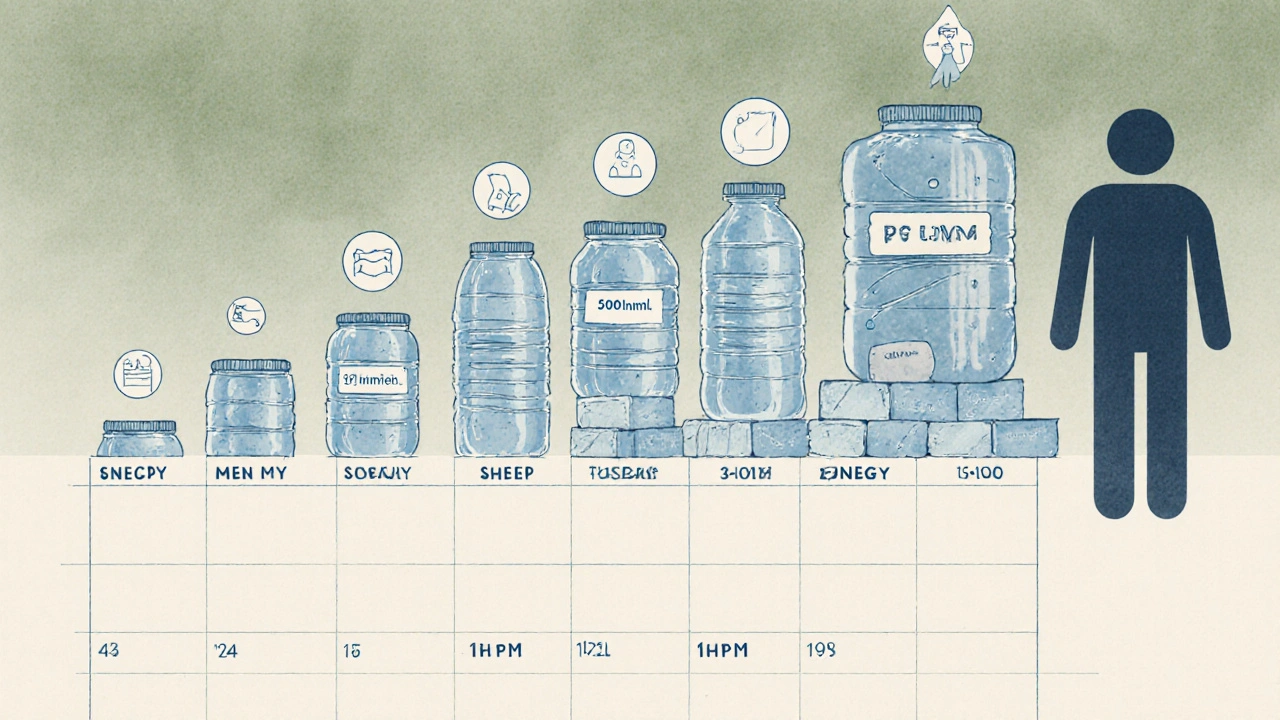
Common Mistakes and How to Fix Them
- Mistake: Waiting until you’re thirsty to drink. Fix: Thirst means you’re already slightly dehydrated. Set phone reminders or pair water with habits you already do-like drinking a glass after brushing your teeth or before every coffee.
- Mistake: Thinking you need fancy electrolyte drinks. Fix: Unless you’re sweating heavily for over an hour, plain water is enough. Electrolyte drinks add sugar and unnecessary calories.
- Mistake: Believing diet drinks are just as good. Fix: Swap them out. Keep water visible. Keep it cold. Make it easy.
- Mistake: Giving up after a week. Fix: It takes 2-4 weeks for habits to stick. Track your water intake with a simple journal or app. After a month, you’ll notice you’re less hungry, more energized, and losing weight without changing your diet.
Why This Works Better Than Most Diets
Most diets fail because they’re complicated. They require counting calories, buying special foods, or avoiding entire food groups. Water? You can’t get banned from it. You don’t need a subscription. You don’t need to wait for delivery. It’s free. It’s safe. It’s everywhere. And the science is clear: when you drink more water, you eat less, burn more, move better, and feel better. It’s not a miracle. But it’s one of the few weight loss tools that actually works without side effects. Harvard’s Dr. Walter Willett put it best: “Promoting water consumption requires no pharmaceutical intervention, has no side effects, and can be implemented globally regardless of socioeconomic status.” That’s the power of hydration.Can drinking water really help me lose weight without changing my diet?
Yes. Studies show that simply increasing water intake-especially drinking 500ml before meals-leads to measurable weight loss over time, even without changing what you eat. One 12-month study found that each 1% increase in water consumption relative to total beverages led to 0.13kg more weight loss. The mechanism is mainly appetite suppression and slight metabolic boost, not calorie restriction.
Is it better to drink water before meals or throughout the day?
Both matter, but drinking water 30 minutes before meals has the strongest impact on reducing food intake. Drinking water throughout the day keeps your metabolism steady and prevents dehydration, which can slow fat burning. For best results, combine the two: sip water all day, and drink a full glass before each main meal.
Does drinking cold water burn more calories than room temperature water?
Yes, but only slightly. Your body uses energy to warm cold water to body temperature, burning about 4-7 extra calories per 500ml glass. That’s not a lot, but if you drink 2-3 liters a day, it adds up to 20-50 extra calories burned daily. It’s a small bonus-not the main reason to drink water.
Can I drink too much water while trying to lose weight?
It’s possible, but extremely rare. Water intoxication only happens when someone drinks more than 10 liters in a few hours. For weight loss, sticking to 2-3 liters extra per day (on top of your normal intake) is safe and effective. If you’re urinating frequently but not feeling bloated or nauseous, you’re fine.
Why do diet drinks make weight loss harder even though they have zero calories?
Artificial sweeteners can trick your brain into expecting sugar, which may increase cravings and disrupt gut bacteria linked to metabolism. Some studies show people who drink diet sodas end up eating more later because their brain doesn’t register the drink as “food,” leading to compensatory eating. Water doesn’t do this-it resets your appetite naturally.
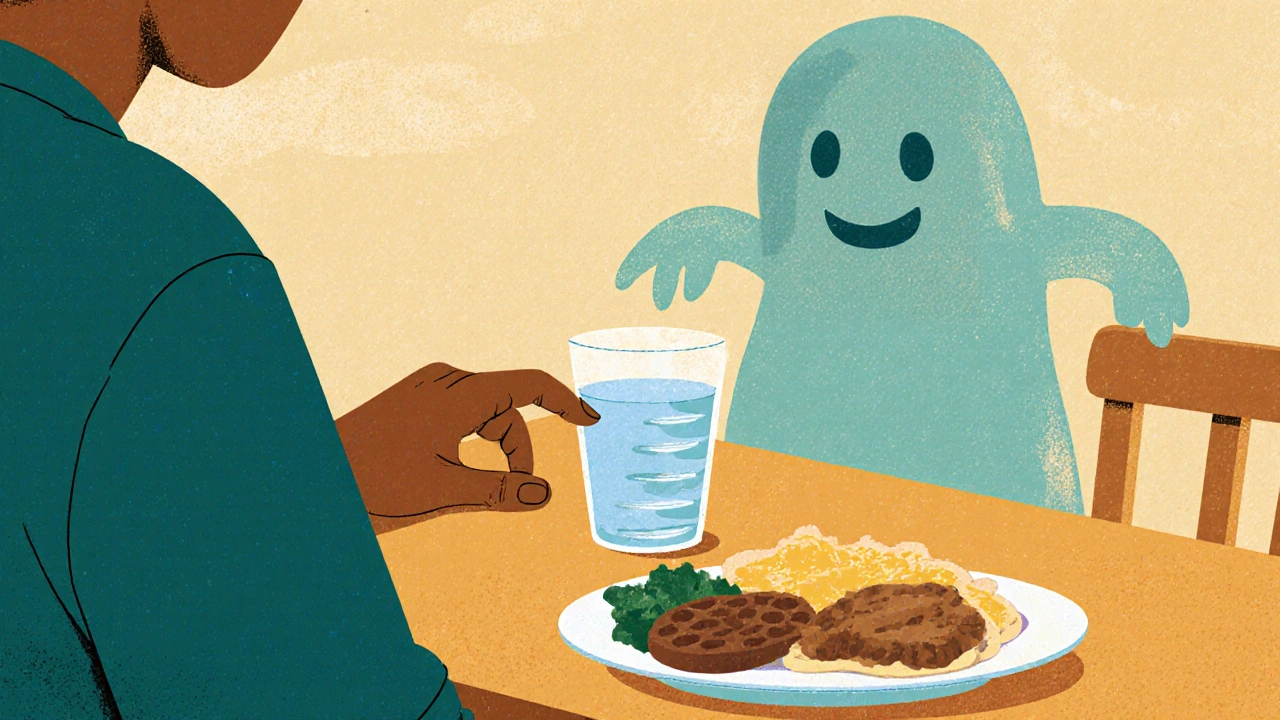


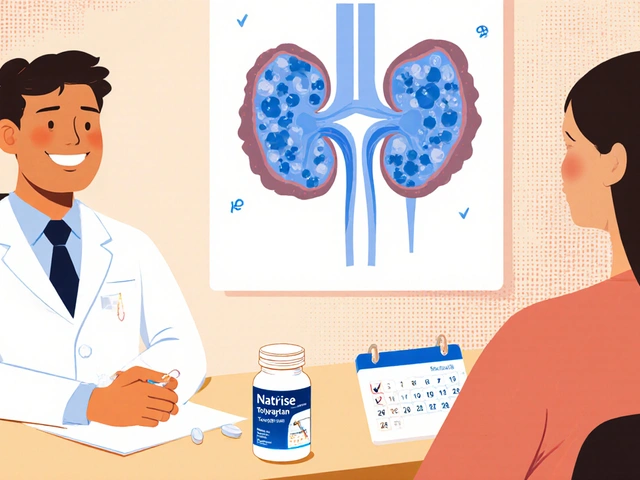
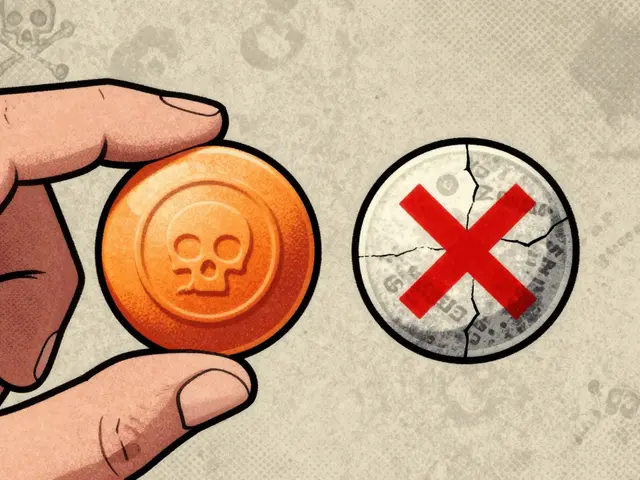
Kane Ren
November 23, 2025 AT 09:31Just drank a glass before lunch-felt full after half my plate. No joke. This works.
Thanks for the push.
Dalton Adams
November 25, 2025 AT 00:17Let me correct you all-this isn’t even ‘new science.’ The vagus nerve response to gastric distension was documented in the 1980s. You’re not ‘discovering’ hydration, you’re just now noticing it exists. Also, cold water thermogenesis? 4–7 kcal per 500ml? That’s less than a single almond. Stop overstating it.
And yes, diet soda disrupts gut microbiota-peer-reviewed, meta-analyses confirm it. But let’s not pretend water is some magical elixir. It’s a tool. Like a spoon. You still have to use it right.
Also, ‘drink before meals’? Try drinking it 45 minutes before. Gastric emptying time varies. 30 minutes is arbitrary. And please, for the love of syntax, stop saying ‘2 liters extra.’ That’s not a thing. Say ‘total daily intake of 2.5–3L.’ Precision matters.
Charmaine Barcelon
November 26, 2025 AT 22:50You’re all wasting your time. Just drink water. That’s it. No apps. No tracking. No excuses. Just water. Water. WATER.
And stop drinking soda. Even the ‘diet’ kind. It’s poison. I know. I’ve seen it. My cousin gained 50 pounds on diet Coke. And now he’s on insulin. Don’t be him.
Karla Morales
November 28, 2025 AT 18:21📊 Data-driven take: A 2023 longitudinal cohort study (n=2,147) showed that habitual pre-meal hydration correlated with a 1.8kg greater weight loss over 16 weeks (p<0.01) vs. controls. The effect size was moderate (Cohen’s d=0.57).
However, compliance was only 62%. So the real metric isn’t water-it’s adherence. Which brings us to behavioral economics: water must be frictionless. Bottles at desk. Fridge at eye level. No sugar alternatives. That’s the intervention.
Also-yes, cold water burns calories. But only if you’re not wearing a sweater. Thermogenesis is context-dependent. 🧊
Javier Rain
November 28, 2025 AT 20:01Bro. I lost 14 pounds in 6 weeks just by drinking water before every meal. No keto. No fasting. No gym. Just water.
Started with one glass. Then three. Then I bought a big bottle and kept it on my desk. Now I don’t even think about it. It’s automatic.
You don’t need to overcomplicate this. Just do it. Your body will thank you. I promise.
Laurie Sala
November 29, 2025 AT 02:47I tried this... and I cried. Not because I lost weight-though I did-but because I realized I hadn’t drunk water in years. Not really. I drank coffee. Soda. Juice. But never just... water.
And then one day, I drank a glass before dinner-and I didn’t crave dessert. I just... felt calm. Like my body finally understood me.
It’s not about the calories. It’s about the silence. The stillness. The space between hunger and need.
Thank you for reminding me I’m alive.
Lisa Detanna
November 29, 2025 AT 06:10In my village in Kerala, we’ve always drunk water before meals. It’s not science-it’s culture. My grandmother said, ‘Eat when your stomach speaks, not your mind.’
And she was right. No one there is obese. No one. Not because they eat less, but because they drink first. Simple. Human. Wise.
Western diets overcomplicate everything. Water is the original wellness hack. We forgot that.
Demi-Louise Brown
November 30, 2025 AT 08:14Consistency > intensity.
Hydration is the foundation. Not the flashy supplement. Not the trendy detox.
Just water.
Every day.
Before meals.
That’s it.
Matthew Mahar
December 2, 2025 AT 04:28ok so i tried the water thing and i think i might have drank too much?? my hands are tingling?? and my head feels fuzzy?? am i dying?? pls help i dont wanna die before my tiktok goes viral 😭💧
John Mackaill
December 4, 2025 AT 01:01Interesting how the science aligns with ancient practices-Roman soldiers carried water skins, Chinese tea rituals emphasized timing, Japanese ‘mizu’ culture treated hydration as sacred.
But here’s the real insight: hydration isn’t about weight loss. It’s about presence. When you drink water deliberately, you pause. You notice hunger. You notice thirst. You notice yourself.
That’s the real transformation. Not the scale. The awareness.
Adrian Rios
December 5, 2025 AT 09:00Let me break this down for the people still using diet soda as a ‘healthy’ substitute. You’re not fooling your body-you’re confusing it. Artificial sweeteners like aspartame and sucralose bind to sweet taste receptors in your gut, triggering insulin release without glucose. That’s a metabolic betrayal.
Meanwhile, water? It’s neutral. It doesn’t lie. It doesn’t trigger cravings. It doesn’t send mixed signals. It just... is.
And yes, the 500ml-before-meal trick? It’s backed by randomized controlled trials from the University of Birmingham, the NIH, and even the Mayo Clinic. This isn’t anecdotal. It’s clinical.
Also-don’t wait until you’re thirsty. Thirst is your body screaming for help. You’re already 2% dehydrated. That’s like driving with 3% fuel left. You’re not running on empty-you’re running on fumes.
So fill your bottle. Set a reminder. Make it a ritual. Your future self will thank you.
And if you think this is too simple? That’s the point. The most powerful tools are always the simplest. Water. Sleep. Movement. That’s the holy trinity. No supplements. No shakes. No gurus. Just water.
Casper van Hoof
December 6, 2025 AT 18:31One must consider the phenomenological dimension of hydration: water as an ontological mediator between organism and environment. The act of drinking is not merely physiological but epistemological-it reorients the self toward bodily awareness.
When one consumes water prior to ingestion of food, one interrupts the alimentary automatism of modern consumer culture. One becomes, however briefly, a subject rather than a consumer.
Thus, the weight loss is not the end-it is the symptom of a deeper reclamation of agency over one’s corporeal existence.
Water, in this light, is not a tool. It is a practice.
Pramod Kumar
December 7, 2025 AT 10:08My aunt in Delhi drinks warm water with lemon every morning. She’s 72. No diabetes. No joint pain. Walks 8km daily. Says, ‘Water is the first prayer of the body.’
I used to think it was just a ‘Hindu thing.’ Now I see-it’s human.
And honestly? I tried it. I drank water before meals for a month. Didn’t change my food. But I stopped snacking. Stopped feeling sluggish. My eyes stopped feeling dry.
It’s not magic. It’s just... basic. And we forgot basic.
Thank you for reminding us.
🫖
Kane Ren
December 8, 2025 AT 01:07Someone mentioned water intoxication-yeah, it’s rare, but if you’re chugging 3L in an hour and your head feels like a balloon, STOP. Go to the ER. Seriously.
But for 99.9% of us? Just sip. All day. Before meals. You’ll be fine.